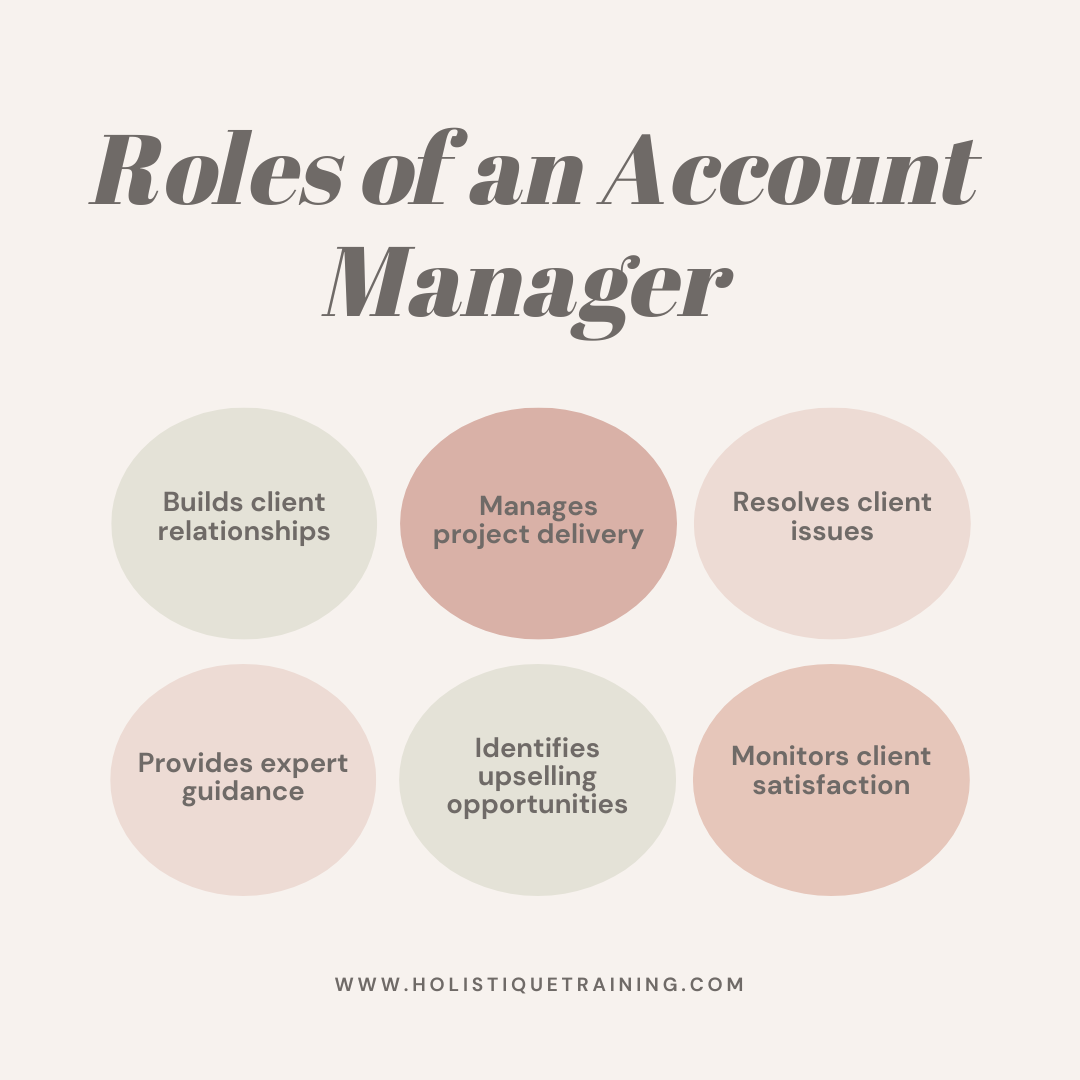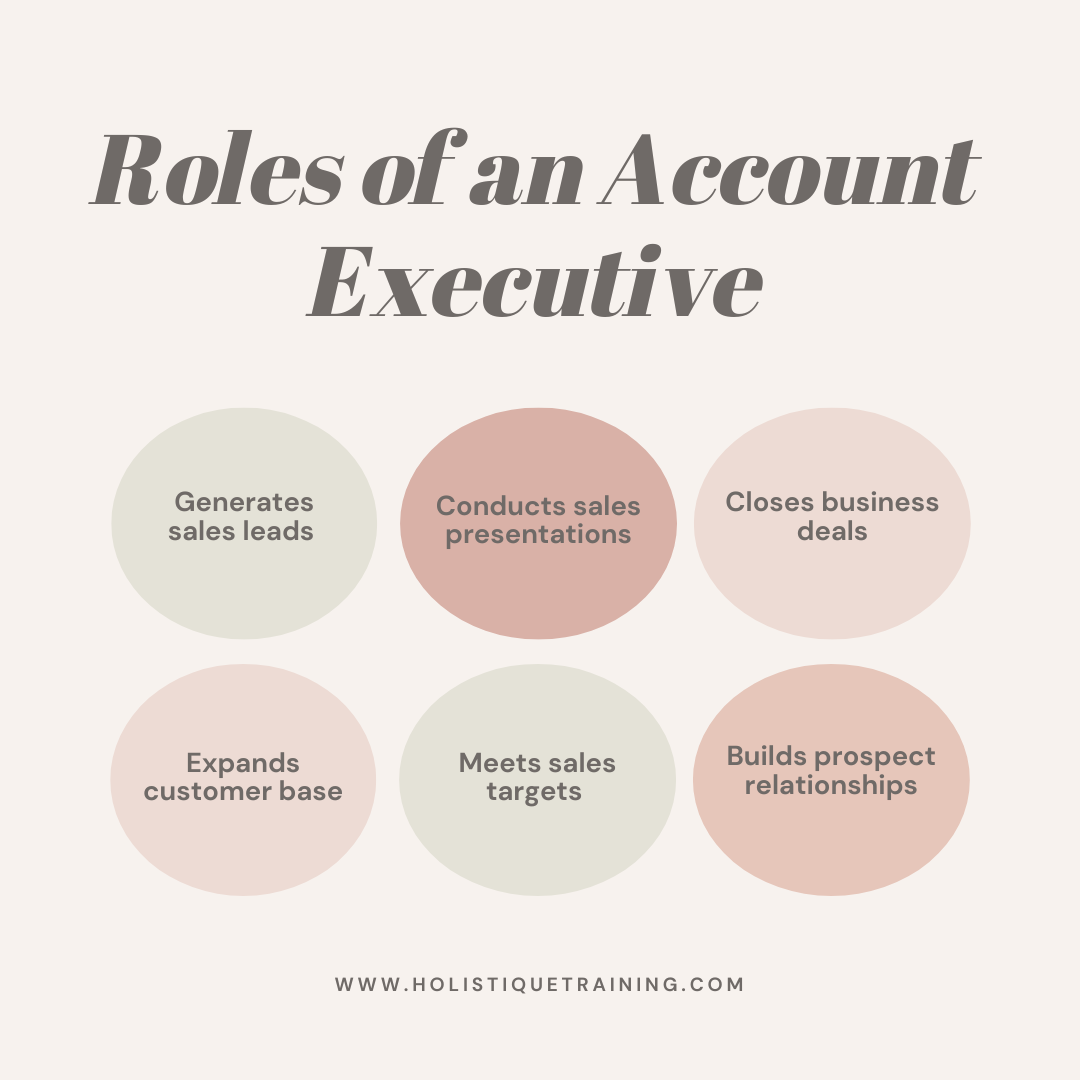- Table of Contents
- Introduction
- Roles and Responsibilities of an Account Manager
- 1. Building and Nurturing Client Relationships
- 2. Understanding Client Needs
- 3. Project Management and Coordination
- 4. Problem-Solving and Conflict Resolution
- 5. Upselling and Cross-Selling
- 6. Monitoring Client Satisfaction and Feedback
- 7. Strategic Account Planning
- Roles and Responsibilities of an Account Executive
- 1. Prospecting and Lead Generation
- 2. Understanding Client Needs
- 3. Sales Presentations and Demonstrations
- 4. Relationship Building and Trust Establishment
- 5. Negotiation and Contract Closure
- 6. Collaboration with Internal Teams
- 7. Sales Reporting and Analysis
- Skills & Qualifications Required for Account Managers and Account Executives
- Skills & Qualifications for Account Managers
- Skills & Qualifications for Account Executives
- Main Differences Between Account Managers & Account Executives
- 1. Client Interaction
- 2. Responsibilities
- 3. Sales Approach
- 4. Client Advocacy
- Is One Position Higher Ranking Than the Other?
- Are There Any Promotion Opportunities Available?
- Career Path of Account Managers & Account Executives
- Career Path of Account Managers
- Career Path of Account Executives
- Salaries of Account Executives and Account Managers
- 1. Account Managers
- 2. Account Executives
- Choosing Between Account Manager & Account Executive
- Account Manager: A Role Rooted in Relationships
- Account Executive: The Thrill of the Hunt
- Making the Choice: Consider Your Strengths and Aspirations
- Conclusion
Introduction
Embarking on a career in the world of sales and client management can be both exhilarating and perplexing. Among the myriad roles in this field, Account Managers and Account Executives stand out as key players, each with distinct responsibilities and challenges. In this comprehensive guide, we'll delve deep into the roles and responsibilities, required skills and qualifications, differences, hierarchy, promotion opportunities, and career paths of Account Managers and Account Executives. By the end, you'll have a clear understanding of these roles, helping you decide which path aligns with your aspirations and skills.
Roles and Responsibilities of an Account Manager
The role of an Account Manager is multifaceted, requiring a unique blend of interpersonal skills, strategic thinking, and a deep understanding of both the client's needs and the company's offerings. Let's delve into the intricacies of their roles and responsibilities:
1. Building and Nurturing Client Relationships
At the core of an Account Manager's role is the ability to build and nurture strong, lasting relationships with clients. They act as the primary point of contact between the client and the company, fostering trust and ensuring that the client's needs are met effectively. Account Managers invest time in understanding the client's business, industry challenges, and objectives, allowing them to tailor solutions that align with the client's goals.
2. Understanding Client Needs
Account Managers are adept at active listening and empathetic understanding. They engage in meaningful conversations with clients to comprehend their pain points, goals, and aspirations. By gaining deep insights into the client's needs, Account Managers can craft tailored strategies and solutions, ensuring that the services or products offered effectively address the client's specific requirements.
3. Project Management and Coordination
Account Managers oversee various projects and initiatives related to their clients. They collaborate with internal teams, such as sales, marketing, and operations, to meet client expectations. This involves project planning, resource allocation, and timeline management. Account Managers are pivotal in coordinating efforts across different departments, ensuring seamless execution of projects and delivering high-quality results to the client.

4. Problem-Solving and Conflict Resolution
In the dynamic world of client management, challenges and conflicts are inevitable. Account Managers possess excellent problem-solving skills, enabling them to navigate complex situations with finesse. Whether it's addressing a client concern, resolving project-related issues, or managing expectations, Account Managers employ their analytical insight and creativity to find effective solutions. They act as mediators, ensuring that any conflicts are resolved amicably, preserving the client relationship.
5. Upselling and Cross-Selling
Account Managers are proactive in identifying opportunities for upselling and cross-selling. By thoroughly understanding the client's business and industry trends, they can recommend additional products or services that could benefit the client. This strategic approach adds value to the client and contributes to the company's revenue growth. Account Managers leverage their expertise to propose complementary offerings, enhancing the client's overall experience with the organisation.
6. Monitoring Client Satisfaction and Feedback
Account Managers continuously monitor client satisfaction levels by gathering feedback and conducting regular check-ins. They seek constructive criticism and positive feedback alike, using this information to enhance the client experience. By staying attuned to the client's sentiments, Account Managers can proactively address any issues, ensuring that the client remains satisfied and loyal to the company.
Table: Roles and Responsibilities of an Account Manager
7. Strategic Account Planning
Account Managers engage in strategic account planning, outlining long-term objectives and goals for each client. They assess the client's evolving needs and align the company's resources and offerings accordingly. This forward-thinking approach ensures that the client's expectations are met in the present, anticipated, and exceeded in the future. Strategic account planning involves market analysis, competitor evaluation, and collaboration with internal stakeholders to develop tailored strategies that drive mutual success.
In essence, Account Managers are the architects of enduring client relationships. Their roles extend beyond mere transactional interactions; they cultivate partnerships built on trust, understanding, and exceptional service. Account Managers contribute significantly to the company's reputation, client satisfaction, and long-term profitability through their dedication and expertise.
Roles and Responsibilities of an Account Executive
Account Executives are the driving force behind acquiring new clients and expanding the company's market presence. Their roles and responsibilities are pivotal in shaping the organisation's growth strategy. Let's explore the intricate responsibilities that fall under the purview of an Account Executive:
1. Prospecting and Lead Generation
Account Executives are responsible for identifying potential clients and generating leads. They conduct extensive market research, analyse industry trends, and attend networking events to identify businesses or individuals who could benefit from the company's products or services. Through targeted outreach and prospecting efforts, Account Executives create a pipeline of potential clients, laying the foundation for future business opportunities.
2. Understanding Client Needs
Account Executives excel at understanding prospective clients' unique needs and challenges. Through active listening and in-depth conversations, they gather valuable insights into the client's objectives, pain points, and desired outcomes. This deep understanding enables Account Executives to tailor their sales pitches effectively, positioning the company's offerings as solutions that directly address the client's specific requirements.
3. Sales Presentations and Demonstrations
Account Executives are skilled presenters, capable of articulating the value proposition of the company's products or services convincingly. They conduct sales presentations and demonstrations, showcasing the features and benefits of the offerings. Through compelling storytelling and effective communication, Account Executives engage potential clients, illustrating how the company's solutions can meet their needs and deliver tangible results.

4. Relationship Building and Trust Establishment
Establishing trust is fundamental in the realm of sales. Account Executives invest time and effort in building relationships with potential clients. They serve as the initial point of contact, creating a positive and trustworthy impression of the company. By demonstrating expertise, integrity, and genuine interest in the client's success, Account Executives lay the groundwork for enduring partnerships, which are essential for securing new business opportunities.
5. Negotiation and Contract Closure
Negotiation is a key skill that Account Executives leverage to navigate the complexities of securing new clients. They discuss pricing, terms, and conditions with potential clients. Account Executives are adept at finding common ground that satisfies both parties, ensuring a mutually beneficial agreement. Once negotiations are successful, they oversee the contract closure process, ensuring that all necessary documentation is completed accurately and efficiently.
6. Collaboration with Internal Teams
Account Executives collaborate closely with internal teams, such as marketing, product development, and customer support, to align sales strategies with the company's overall objectives. They provide valuable feedback from the market, enabling product teams to enhance existing offerings or develop new solutions that cater to client needs. Effective communication and collaboration ensure that the company's offerings remain competitive and relevant in the ever-changing market landscape.
7. Sales Reporting and Analysis
Account Executives are responsible for tracking their sales activities and maintaining detailed records of leads, prospects, and client interactions. They analyse sales data to identify trends, assess the effectiveness of sales strategies, and make data-driven decisions. Through sales reporting and analysis, Account Executives gain insights into their performance, enabling them to refine their approaches, optimise their efforts, and achieve higher conversion rates.
In summary, Account Executives are the architects of new business opportunities. Their roles encompass many responsibilities, from identifying potential clients to closing deals and fostering relationships. Through their strategic approach, persuasive communication skills, and market acumen, Account Executives are pivotal in driving the company's revenue growth and expanding its market presence. Their contributions are instrumental in shaping the organisation's success and ensuring its competitiveness in the marketplace.
Skills & Qualifications Required for Account Managers and Account Executives
Account Managers and Account Executives require distinct skills and qualifications to excel in their respective roles. Let's explore these skills and qualifications in detail for each position:
Skills & Qualifications for Account Managers
1. Interpersonal Skills
Account Managers need exceptional interpersonal skills to build and maintain strong client relationships. They should be empathetic, active listeners who can effectively understand clients' perspectives and concerns. Good communication skills are essential for conveying ideas clearly and resolving issues efficiently.
2. Negotiation Skills
Account Managers often find themselves in situations requiring negotiation, whether it's discussing contract terms, resolving conflicts, or managing client expectations. Strong negotiation skills enable Account Managers to find mutually beneficial solutions and maintain positive client relationships.
3. Problem-Solving Abilities
Account Managers must be adept problem solvers. They encounter challenges such as client issues, project delays, or communication barriers. The ability to analyse problems, identify root causes, and devise effective solutions is crucial for Account Managers to ensure client satisfaction and project success.
4. Project Management Skills
Account Managers oversee multiple projects simultaneously. Proficiency in project management, including time management, resource allocation, and goal setting, is essential. They should be able to coordinate tasks, set priorities, and ensure that projects are completed on time and within budget.
5. Industry Knowledge
A deep understanding of the industry in which the client operates is valuable for Account Managers. Knowledge about market trends, competitors, and industry-specific challenges equips them to provide valuable insights to clients and offer solutions tailored to their sector.
6. Client Focus
Account Managers need to be client-focused, putting clients' needs and satisfaction at the forefront of their efforts. They should be proactive in anticipating client requirements and dedicated to delivering exceptional service, ensuring clients feel valued and understood.
7. Team Collaboration
Account Managers collaborate with various internal teams, such as sales, marketing, and product development. Strong teamwork and collaboration skills are essential to foster seamless communication and cooperation among team members, ensuring that client expectations are met effectively.
Skills & Qualifications for Account Executives
1. Sales Acumen
Account Executives must possess a deep understanding of sales techniques, including prospecting, lead generation, and closing deals. They should also be persuasive communicators capable of effectively articulating the company's offerings' value proposition.
2. Resilience and Persistence
Sales can be challenging, and rejection is a common part of the process. Account Executives need to be resilient and persistent, capable of handling rejection professionally and bouncing back with enthusiasm for the next opportunity.
3. Market Research Skills
Account Executives should have strong market research skills to identify trends, analyse competitors, and understand the target audience. This knowledge helps them tailor their sales pitches and approaches to meet market demands.
4. Relationship Building
Building rapport with potential clients is crucial for Account Executives. They should be skilled in relationship building, creating connections, and establishing trust with prospects. Trustworthy relationships often lead to successful deals and long-term partnerships.
5. Time Management
Account Executives often juggle multiple leads and prospects simultaneously. Effective time management skills help them prioritise leads, focus on high-potential opportunities, and efficiently allocate their time and efforts.
6. Tech-Savvy
Proficiency in using sales and customer relationship management (CRM) software is essential for Account Executives. They need to track leads, manage customer interactions, and analyse data to make informed decisions and improve their sales strategies.
7. Presentation Skills
Account Executives should be excellent presenters, capable of delivering compelling sales pitches and presentations. Clear, engaging presentations help them captivate the audience, communicate the value proposition effectively, and close deals successfully.
In summary, Account Managers and Account Executives need a unique blend of skills, including interpersonal abilities, industry knowledge, sales acumen, and technology proficiency. These skills, combined with relevant qualifications and experience, empower professionals in these roles to navigate the complexities of client management and sales, contributing significantly to the organisation's success.
Main Differences Between Account Managers & Account Executives
The main differences between Account Managers and Account Executives lie in their core responsibilities, focus, and areas of expertise within the sales and client management domain. Let's delve deeper into these distinctions:
1. Client Interaction
Account Managers: Account Managers primarily engage with existing clients, focusing on building and nurturing long-term relationships. They understand the clients' needs deeply, offer personalised solutions, and ensure client satisfaction. Account Managers act as the clients' advocates within the company, resolving issues, and ensuring the delivery of promised services or products.
Account Executives: Account Executives, on the other hand, focus on acquiring new clients. They engage in prospecting, lead generation, and sales presentations. Account Executives are skilled at identifying potential clients, understanding their requirements, and persuading them to choose the company's products or services. Their interactions are often geared towards securing new business opportunities.
2. Responsibilities
Account Managers: Account Managers are responsible for overseeing existing client accounts. They manage projects, resolve problems, and ensure that the clients' needs are met. Account Managers collaborate with internal teams to deliver services or products according to the clients' expectations. Their role is centred around client retention, satisfaction, and loyalty.
Account Executives: Account Executives are responsible for generating new business. They focus on sales strategies, lead generation, and closing deals. Account Executives are proactive in identifying potential clients, conducting sales pitches, negotiating contracts, and bringing in revenue. Their primary objective is to expand the company's customer base and meet sales targets.
3. Sales Approach
Account Managers: Account Managers employ a consultative and relationship-driven sales approach. They emphasise understanding the clients' businesses thoroughly, anticipating their needs, and providing customised solutions. Account Managers prioritise long-term client partnerships and work towards ensuring client loyalty and retention.
Account Executives: Account Executives use a proactive and persuasive sales approach. They focus on lead generation, conducting sales presentations, and closing deals. Account Executives highlight the benefits of the company's offerings, address clients' pain points, and employ effective negotiation techniques to win new business. Their goal is to secure immediate sales opportunities and expand the customer base.
4. Client Advocacy
Account Managers: Account Managers serve as the clients' advocates within the company. They understand the clients' businesses deeply, ensuring that the company's internal teams align their efforts to meet clients' requirements. Account Managers play a vital role in ensuring that clients receive exceptional service, and their feedback is incorporated to enhance client satisfaction.
Account Executives: Account Executives act as the company's ambassadors to potential clients. They represent the company's offerings, values, and strengths. Account Executives build credibility, instil confidence, and showcase the company's products or services compellingly, aiming to win the clients' trust and secure new business relationships.
In summary, while both Account Managers and Account Executives contribute significantly to a company's success, their roles are distinctly different. Account Managers focus on nurturing existing client relationships and ensuring client satisfaction, while Account Executives concentrate on acquiring new clients and expanding the company's market presence. Each role demands unique skills, approaches, and expertise, catering to different aspects of the sales and client management process.
Is One Position Higher Ranking Than the Other?
Neither position can be unequivocally deemed higher ranking than the other. Both Account Managers and Account Executives play pivotal roles in the company's growth and success. The hierarchy often depends on the organisation's structure and how it values client retention versus acquisition. In some companies, Account Managers might hold a higher status due to the emphasis on long-term client relationships, whereas in others, Account Executives might be esteemed for their ability to bring in new business.
Are There Any Promotion Opportunities Available?
Both Account Managers and Account Executives have ample opportunities for advancement within their respective career paths. Account Managers can progress to senior-level positions, such as Senior Account Manager or Account Director, where they manage larger accounts and lead teams of Account Managers. They may also transition into roles like Sales Director or Business Development Manager, overseeing the organisation's overall sales strategies.
Account Executives who demonstrate exceptional sales performance and leadership qualities can move up the ladder to become Sales Managers or Sales Directors. With extensive experience and a proven track record, they might even ascend to the role of Vice President of Sales or Chief Sales Officer, where they shape the company's sales vision and strategies.
Career Path of Account Managers & Account Executives
The career paths of Account Managers and Account Executives offer various opportunities for growth and specialisation within the realm of sales and client management. Let's explore the potential trajectories and options available for professionals in these roles:
Career Path of Account Managers
Junior Account Manager
Entry-level professionals often start as Junior Account Managers, learning the ropes of client management and relationship building.
Account Manager
After gaining experience and showcasing their skills, Junior Account Managers can advance to the role of Account Manager. In this position, they manage their own portfolio of clients, taking on more significant responsibilities.
Senior Account Manager
Account Managers with a proven track record and extensive experience can move up to become Senior Account Managers. In this role, they handle larger and more complex accounts, overseeing multiple projects and a team of Account Managers.
Account Director
Senior Account Managers who demonstrate exceptional leadership and strategic abilities may be promoted to the role of Account Director. Account Directors oversee the overall client relationships within a department or the entire organisation, working closely with executives to align client strategies with business goals.
Sales Director or Business Development Manager
With a strong background in client management, some Account Directors transition into roles such as Sales Director or Business Development Manager. These positions focus on high-level sales strategies, market expansion, and building partnerships that contribute significantly to the company's growth.
Executive Level Roles
Exceptional professionals may progress to executive-level roles, such as Vice President of Client Services or Chief Customer Officer, where they are pivotal in shaping the organisation's client-centric strategies and driving revenue growth.
Career Path of Account Executives
Sales Representative
Entry-level professionals often start as Sales Representatives, responsible for generating leads, conducting sales pitches, and closing deals. They gain hands-on experience in the art of sales and customer engagement.
Account Executive
Experienced Sales Representatives can move up to become Account Executives. They take on more significant responsibilities in this role, handling larger clients and more complex sales processes. Account Executives focus on building relationships and closing deals to meet sales targets.
Senior Account Executive
Account Executives who consistently meet or exceed their sales targets may be promoted to Senior Account Executives. They handle high-value clients and larger sales opportunities in this position, contributing significantly to the company's revenue.
Sales Manager
Senior Account Executives with leadership potential may transition into Sales Manager roles. Sales Managers oversee a team of Account Executives, providing guidance, training, and support to ensure the team achieves its sales goals.
Sales Director
Exceptional Sales Managers can advance to become Sales Directors. Sales Directors develop and execute sales strategies, manage sales teams, and collaborate with other departments to drive the company's sales objectives.
Vice President of Sales or Chief Sales Officer
Sales Directors who excel in their roles may reach executive-level positions, such as Vice President of Sales or Chief Sales Officer. In these positions, they play a critical role in shaping the company's overall sales vision, strategy, and revenue generation.
Both Account Managers and Account Executives have diverse career paths, offering opportunities for specialisation and advancement. Professionals in these roles can leverage their expertise to explore various avenues within the sales and client management domain, ensuring continuous growth and development throughout their careers.
Salaries of Account Executives and Account Managers
1. Account Managers
Account Manager jobs predominantly feature a base salary, complemented by bonuses and/or commissions. According to data from Fit Small Business, the average base salary for an account manager is $56,792 per year, with a typical range between $39,000 and $85,0001.
Sales bonuses for Account Managers vary widely, ranging from $978 to $20,000 per year. Additionally, annual commission payments can range from $2,000 to $38,000. Some account managers also receive profit-sharing compensation, which is between $576 and $12,000 annually.
2. Account Executives
Due to performance-based incentives, Account Executives often earn comparable or higher earnings than Account Managers. The average base salary for Account Executives is $57,055 per year, ranging between $39,000 and $93,000.
Bonuses for Account Executives exhibit a wide spectrum, ranging from $998 to $41,000 per year. Similarly, commission compensation can vary significantly, ranging from $4,000 to $51,000. Some companies with profit-sharing programmes also provide additional payments ranging from $980 to $26,000 annually.
One notable difference is the pay increase based on experience. Account executives experience a higher pay growth rate with experience than account managers. Late-career or very experienced Account Executives can see base salaries that are 25% to 38% higher than the average, while Account Managers typically experience a 13% to 16% increase.
It's essential to remember that these figures can vary based on factors such as industry, location, company size, and individual performance. As you consider your career path, understanding the potential earnings in both roles is vital for making an informed decision.
source: www.fitsmallbusiness.com
Choosing Between Account Manager & Account Executive
Choosing between a career as an Account Manager and an Account Executive can be a pivotal decision, influencing your professional growth and job satisfaction. Here’s a detailed exploration to help you determine which path aligns best with your skills, personality, and aspirations:
Account Manager: A Role Rooted in Relationships
Is Account Management Right for You?
1. Relationship Building: If you thrive on building and nurturing long-lasting relationships, enjoy understanding clients' needs deeply, and find fulfilment in ensuring their satisfaction, Account Management might be your calling. Account Managers act as the client’s trusted advisor, ensuring their concerns are heard and their objectives are met.
2. Problem-Solving Skills: Account Managers need excellent problem-solving abilities. If you enjoy tackling challenges, finding creative solutions, and effectively addressing client issues, this role allows you to demonstrate your analytical and strategic thinking skills.
3. Patience and Empathy: Account Managers need patience and empathy to handle diverse client personalities and navigate challenging situations. Account Management could be a fulfilling choice if you have a compassionate nature, excellent listening skills, and a genuine interest in helping clients succeed.
4. Team Collaboration: Account Managers collaborate closely with internal teams. If you enjoy teamwork, possess strong communication skills, and find joy in orchestrating efforts across different departments to deliver outstanding client outcomes, Account Management offers ample opportunities for collaboration.
Account Executive: The Thrill of the Hunt
Is Sales and Business Development Right for You?
1. Persuasive Communication: If you possess the gift of gab, enjoy convincing others, and find excitement in crafting persuasive sales pitches, Account Executive roles are tailored for individuals who can articulate value propositions effectively.
2. Resilience and Persistence: Sales can be a rollercoaster ride. If you have a resilient spirit, the ability to bounce back from rejections, and the persistence to keep pushing forward despite challenges, the dynamic world of Account Executive might be your ideal playground.
3. Results-Driven Attitude: Account Executives are often motivated by targets and results. If you are goal-oriented, thrive on achieving quotas, and find fulfilment in meeting and exceeding sales goals, the Account Executive role provides an environment where your ambition can thrive.
4. Adaptability and Agility: Markets and client needs change. If you enjoy staying updated on industry trends, are adaptable to change, and can quickly adjust your sales strategies to align with evolving market demands, the role of an Account Executive allows you to harness your agility.
Making the Choice: Consider Your Strengths and Aspirations
When choosing between Account Management and Account Executive roles, reflect on your inherent strengths, interests, and long-term aspirations. Ask yourself:
What Energises You? Consider whether you find more joy in building enduring client relationships or in the exhilarating pursuit of new business opportunities.
What Are Your Skills? Evaluate your communication style, problem-solving abilities, and resilience. Determine which role aligns seamlessly with your skills and strengths.
Where Do You See Yourself Long-Term? Consider your career trajectory. Are you inclined towards leadership roles in client management, or do you envision yourself driving sales strategies and market expansion?
Ultimately, the right choice depends on your passion and where you feel most fulfilled. Both roles offer distinct challenges and rewards. Whether you choose to cultivate client partnerships as an Account Manager or the excitement of securing new business as an Account Executive, your decision should resonate with your essence, ensuring a fulfilling and successful career journey in the dynamic world of sales and client management.
Conclusion
In the intricate tapestry of sales and client management, Account Managers and Account Executives weave essential threads, each contributing uniquely to the organisation's success. Whether you find your niche in the art of client retention or the thrill of business expansion, both roles offer rich opportunities for personal and professional growth.
Understanding these roles' nuances, responsibilities, required skills, and career trajectories equips you with the knowledge needed to make an informed decision. As you contemplate your path, remember that your choice should resonate with your strengths, passions, and aspirations. Embrace the role that aligns seamlessly with your essence, and you'll embark on a rewarding journey, significantly impacting the ever-evolving landscape of sales and client management.
























